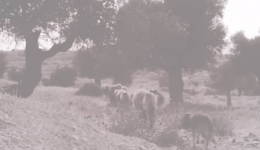Category:
John 1:11 - "He came to that which was his own, but his own did not receive him."
Living as I do in a relatively northern clime, I am glad as each autumn departs and winter comes, when God finally white-washes the world. I have never liked November. I'm glad when December comes, when Advent comes - especiallly, when Christmas FINALLY comes!
Perhaps it was the memory I have of the November day in school, the 23rd - 1963, when as a young teenager I heard the horrific news that John F. Kennedy has been assasinated in Dallas, Texas. I learned later also that this was the same day on which C.S. Lewis died. And then came the year(s) separated by little more than a decade when on that same day my grandfather died (in 1967) and subsequently also my grandmother (in 1976).
November: - the trees are bare, the skies gray and often there is rain -- cold rain. Summer's colour, charm and beauty is gone and winter is coming; but there is no snow – and it is not yet Christmas. I have often through the years experienced a black depression in November's dark days. I feel like the Calvinist who fell down the stairs and after, getting up, murmured, "Thank God that's over with."
But Christmas is coming, as it does come 'round each year, and the Salvation Army and Santa Clauses are claiming their bells in crowded malls. Exhaust fumes pray heavenward and cars parade in endless circles and lines of shopping malls lts, their occupants seeking with the utmost futility for a place to park. This is not the Hope of Christmas is to be about!
Everyone is bundled up against the cold and perhaps also against any sense of what all the fuss is really about (i.e. the 'reason for the Season'). But still, as author Frederick Buechner puts it, ‘If you concentrate just for an instant, far off in the deeps of you somewhere you can feel the beating of your heart. For all its madness and lost-ness, not to mention your own, you can hear the world itself holding its breath – waiting.’
Advent is a time of waiting. But God seems to be taking so long to come to us - to finally 'show up' if we cay say that without being too irreverent. Sometimes God, if we believe in God at all, seems remote and powerless, a child's dream. From his point of view he gives time for repentance; from our point of view we just want to get on with life and, perhaps, with not having to deal with deep and eternal verities. And yet, as C.S. Lewis wrote in Mere Christianity – "Christians think that God is going to land in force, we do not know when. But we can guess why He is delaying. He wants to give us the chance of joining His side freely."
When visiting England some years ago, I noticed a phenomenon the locals seemed to take for granted, that of forming and joining in long queues. The English seem to be always lined up, waiting for something. Perhaps we're like that at Advent - merely in line - waiting somewhat anxiously, or perhaps prayerfully, or perhaps somewhat desperately - or maybe with complete boredom or utter frustration; or dread, even. Someone says: 'It is hard to wait, especially for those whose only doctrine and creed is relevance.'
Someone else has written (and I've forgotten who - perhaps Dr. Maurice Boyd(?)) - "They are required always to live for the moment, and to demand that life be lived as experience and not expectation, and experience that somehow "counts," that make sense and makes a difference, that "does it" for them. But, says T.S. Eliot, reflecting on life's darkness that leads often to despair: - "The faith and the love and the hope are all in the waiting. Thus the darkness shall be light and the stillness the dancing."
Some years ago now, novelist Dan Wakefield wrote about the divorced life, in a book he called Starting Over. In it he said, "The Christmas season is the most prolonged and dangerous siege of all single people's personal war to survive. The generally, consoled specter of it hangs just a few days ahead of them, the psychic bombardment that every only person most fears and dreads, from the first sign of tricky sales or through the incessant clanging of carols, to the last bleary notes of Auld Lang Syne." How sad - and 'blue' is this Season for so many. Can we pray, help, do something to be with them in such times of pain?
And in general, as Eugene Peterson writes: "The world is, in the word insurance agents use to designate our wrecked cars, totaled.” H.G. Wells wrote with similar sentiment a story in which a man must stay alone in a house which he believes to be haunted. The only light he has comes from a number of candles of different lengths. One by one the candles go out until there is only darkness. For so many, that is the kind of world in which they live.
But the New Testament writer, St. John writes about Jesus, God's Word - God's Self in Christ, became flesh and lived among us. "He came to that which was his own."
He came to his own. Salvation, peace and wholeness always come from God's initiative to us and on our behalf. He comes to our rescue. God so loved the world that he gave – and God keeps on giving. "While we were yet without strength," writes St. Paul, "Christ died for us." Like a shepherd He leaves the 99 sheep that are safe in the fold and goes after one - the lost one. He's like the woman who turns her house upside-down, looking for a coin that's so precious to her. She rejoices when he has found it. He is like a king who throws a huge, lavish-spread banquet and sends out his servants to bring in anyone and everyone they can find. He's that father who runs down the driveway and way down the street to greet the estranged son who is dragging himself home. Daily, he's been waiting, watching for him. Jesus came to his own but the world would not have Him and so many still will not have Him today. He often still gets a a rude welcome, actually.

It was a rude welcome because - who He was and how He came was not at all what was expected. Just when we have God in a corner where we can handle Him, understand Him, debate about Him, box up and package our wrongly conceived and constructed god(s) to suit our tastes, squeezing God into our own, familiar, middle-class modes, just when . . . . something arrests us and brings us back to the reality that he defies all religious stereotypes. "Again and again, Christ is present not where you would be apt to look for him," says Frederick Buechner – "but precisely where you would not have thought to look for him in 1000 years."
We might think of the Old Testament prophet Malachi who with morbid doomsday warning to God's People in his day, cried, "Woe to you who long for the Day of the Lord. For He will come as fuller’s soap and refiners fire. In other words, God will come to rub almost raw God's people in cleansing them - to burn them almost to death with cleansing, purifying fire. Like Malachi, John the Gospel writer did not mix words. He is pointed with words: – 'His own did not receive Him."
Who is this Jesus who comes? - the One Who is quite unlike our expectations? Again Frederick Buechner: - "Christ was a tiger, the denouncer of a narrow and loveless piety, the scourge of the merely moral, the enemy of every religious tradition of his day."
Christians who talk about morality, about right and wrong, are seen to be narrow and judgmental – bigoted fanatics. But Jesus comes not only to forgive and to save, to show his mercy and grace, but also to judge and put right everything and everyone, even if they will not repent or care to live their lives according to the standards or his Word. Some want forgiveness but not repentance. They think they may continue to embrace their sins, the things that are clearly against God's expressed will – habits and lifestyles that are against their best interest, and those of others in the world, if only they could see it. But most often they / we cannot – so we reject this Jesus. We want peace but without the Prince. And with that rejection the world is propelled even further into sin and misery and despair.
Yet God keeps loving and reaching out to us in Christ, the Baby of Bethlehem who has become the King of Kings and Lord of Lords. Author Madeleine L'Engle asks, When is the time for love to be born? / The inn is full on the planet earth, / And by greed and pride the sky is torn – / Yet love still takes the risk of birth.

In fairy tales, not everyone lives happily ever after. But no matter how dark the things that happen, the implication of fairy tales is this, that darkness is not the ultimate reality, and thus – as Tolkien writes, they can give us "a catch of the breath, a beat and lifting of the heart, near to (or indeed accompanied by) tears."
So it is that in the story of Christ the rejection is not the end of the story, the suffering – even a crucifixion, is not all he wrote. There is point and purpose in the suffering. in Cry the Beloved Country, written about South Africa before the end of apartheid, Alan Paton said, "I have come to believe that our Lord suffered not to save us from suffering but to teach us how to bear suffering. He knew that there is no life without suffering." Thomas a Kempis concurred, “If you will suffer no adversity, how may you be the friend of Christ?" And, I also think of the wonderful title to a book of Margaret Clarkson – "Grace Grows Better in Winter." There is so much that is wonderfully true, though difficult, in these assertions.
But some did receive him.
There are those who do embrace God's call and His Gift to us Who is Jesus; those who see beyond the words: the Word of God - not 'it' but Him. They see God incarnate in Jesus. God in human flesh - 'contracted in a span,' as John Wesley put it. Seeing and hearing and believing, they submit to the Lordship and to the rule of this Prince, even as they eagerly receive the Gift of His salvation and enter into the Life of the ages - actually, the Life of 'the Age to come,' which is the Life that Jesus called abundant. They know, at least they believe (and, yes, sometimes it seems all evidence is to the contrary), that another world is coming – aborning, because of the Person and Work of Jesus..
Advent is about waiting, about hoping even in the midst of suffering. In the middle of the muddle of our present lives we may yet pause to remember and to celebrate just because - precisely because of all that Christ has done and all that He is for us and for this planet - in order that those who receive Him still, may be called “the children of God.”








